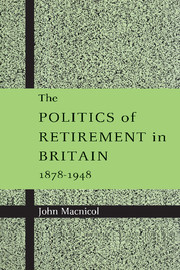Book contents
- Frontmatter
- Contents
- List of tables
- Acknowledgements
- Part I The campaign for old age pensions
- Part II Contributory pensions
- 7 The First World War and the 1919 Ryland Adkins Committee
- 8 From ‘all-in’ insurance to contributory pensions
- 9 Neville Chamberlain, the ‘New Conservatism’ and the 1925 Act
- Part III The debate on retirement pensions
- Part IV The ‘Beveridge revolution’
- Index
9 - Neville Chamberlain, the ‘New Conservatism’ and the 1925 Act
Published online by Cambridge University Press: 01 October 2009
- Frontmatter
- Contents
- List of tables
- Acknowledgements
- Part I The campaign for old age pensions
- Part II Contributory pensions
- 7 The First World War and the 1919 Ryland Adkins Committee
- 8 From ‘all-in’ insurance to contributory pensions
- 9 Neville Chamberlain, the ‘New Conservatism’ and the 1925 Act
- Part III The debate on retirement pensions
- Part IV The ‘Beveridge revolution’
- Index
Summary
Labour's failure of nerve meant that when the Conservatives swept back into office in November 1924, with a massive 223-seat majority, the way was open for the introduction of a contributory pensions scheme. This was to be the cornerstone of the ‘New Conservatism’, symbolising the determined efforts of Baldwin, Churchill and Chamberlain to defeat socialism on its own terms by forging a new kind of social policy – one that would woo the working-class electorate while involving minimal redistribution between classes and, if possible, no contribution from the state. The combination of political creativity and Treasury determination was to prove irresistible.
Much of the groundwork had already been done by the Anderson Committee, which had skilfully narrowed all the policy options down to one. By the time they completed their second interim report and passed it on to Philip Snowden, the committee members had had five months in which to consider the question carefully. The first half of this second interim report dealt with widows' pensions, and firmly concluded that such a scheme could only be contributory (because of the nation's economic difficulties), compulsory (for actuarial soundness) and limited to the employed population (so that the existing National Health Insurance machinery could be used to deduct contributions). A contributory basis would also avoid all the means-testing problems that were the source of such bitterness in the existing old age pension scheme. The ‘male breadwinner’ assumption was paramount. The aim of the widows' and orphans' pension scheme was to reward the ‘husbandless’ woman: it was ‘to enable mothers, in cases where the family breadwinner is dead, to devote proper care to the upbringing of dependent children’.
- Type
- Chapter
- Information
- The Politics of Retirement in Britain, 1878–1948 , pp. 200 - 224Publisher: Cambridge University PressPrint publication year: 1998



